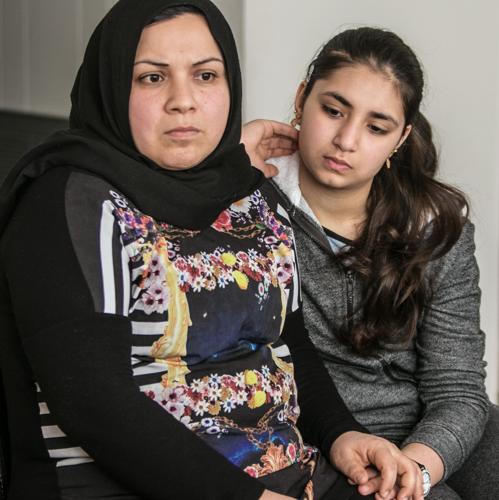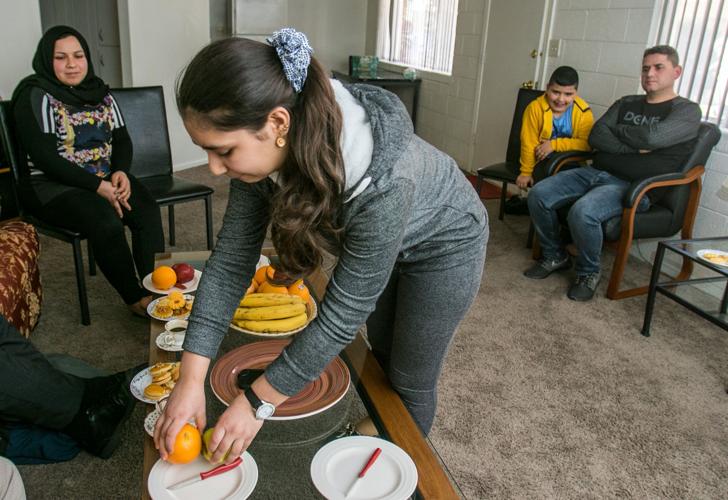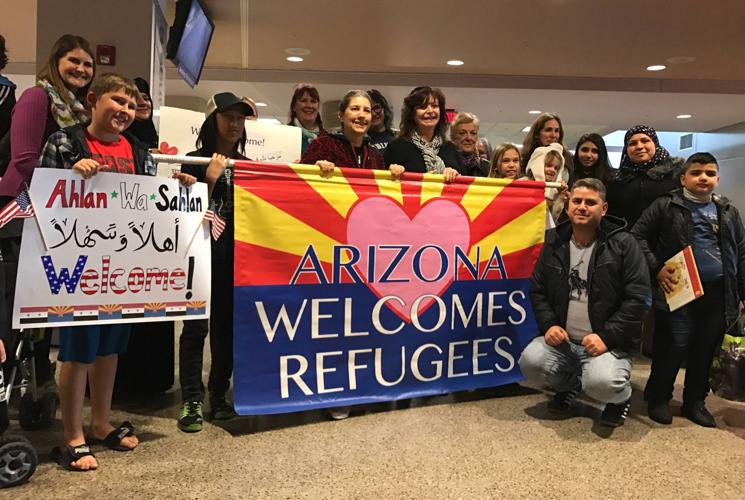With a simple flight delay, Ibrahim, Rohash and their two children would not be here, living in a sunlit midtown apartment, starting a new life together.
They were the last Syrian refugees to make it into Tucson before President Trump’s executive order banning them went into effect Friday afternoon. Trump signed the order at 2:42 p.m. our time, and they arrived in Tucson about 5 p.m.
But they had arrived in Los Angeles earlier in the day, while officials were still admitting refugees from Syria and the other six countries from which Trump suspended new entries, before even green-card holders were being detained, and before other international travelers from those countries were being sent back home across oceans.
It was a stroke of luck. Back in Turkey, Ibrahim, 38, and Rohash, 33, had learned they were headed to Tucson, in care of Lutheran Social Services’ Refugee Focus program, but they didn’t know when. They got notice last week in Istanbul, spent Wednesday night in an airport hotel, then boarded the long flight Thursday afternoon for Los Angeles.
Fourteen hours later, they slipped through America’s door just before it slammed shut.
In Tucson, the arrival was emotional. A group called Arizona Welcomes Refugees had gathered at the airport, as they’ve been doing for months when new families come in from the Middle East and Africa. They were the 60th family since Syrians began arriving here last year. About 200 total families have come to Arizona.
Rania Kanawati, a previous Syrian immigrant who volunteers with refugees, translated for me as I spoke with the newcomers in their nicely furnished little place. We are not using their last names, out of concern for their security.
Kanawati said Ibrahim was overwhelmed by the generosity of the airport volunteers.
When I arrived Tuesday afternoon, Ibrahim and Rohash’s family was receiving visitors — another refugee family from Syria had stopped by. Both families are Kurds from the north of the country and now live in the same small complex.
Despite the warm welcome, the timing of the trip was painful for the family, a fact that underscores the arbitrariness of Trump’s order. Ibrahim’s two brothers and their families also are refugees living in Turkey. They also were scheduled to be resettled in Tucson, making this place a more comfortable new home for the whole clan. But Ibrahim, Rohash, and their daughter Rooha, 13, and son Abdurahman, 9, were the only ones to make it out before their kind was deemed an acute security risk.
Ibrahim has no idea what will happen to his brothers’ families, and neither does the Refugee Focus agency. Since Trump’s order bans Syrian refugees from the United States indefinitely, there is little hope now they will be resettled here. Rohash’s siblings’ families are already scattered across Europe, in Germany, Denmark and Sweden, with one brother still left in Turkey, she said.
Trump’s order can be justified in some of its details, but its implementation was sweeping and arbitrary. It left innocent families, cherished U.S. residents and valued travelers in the lurch. It would not have been hard to impose increased vetting of refugees and travelers without hurting innocents — among them 721 people whom U.S. officials prevented from boarding flights overseas over the weekend. But it would have taken time and study, and it would have robbed the measure of its shock value, which was probably part of the intended effect.
It was not the first experience of shock for Ibrahim and Rohash’s family. Their journey here started when they left their hometown, Afrin, in northern Syria, for Aleppo, the nearest big city, looking for better opportunities, a couple of years before the Syrian civil war started in 2011.
In 2013, the civil war came to Aleppo with fury, Ibrahim said.
“Where they were living, they could see the missiles and bombs hitting the neighbors,” Kanawati said. “He’ll never forget the noise that was around him —bombs and children screaming.”
They fled back home to Afrin, spent a couple of months there, then took off into nearby Turkey and signed up with the United Nations as refugees. They ended up in Istanbul and lived there for more than three years, answering question after question about where they are from, who their relatives are, where their relatives are buried — a long, repetitive inquest that preceded approval by the United States.
That all led to the exciting word of their departure last week — and the disappointing word of their unexpected separation from their extended family.
Now, though, their focus is simple: school. Thanks to the war, Rooha has been out of school for six years, and Abdurahman has never attended. They both have a lot of learning to do — in another new country, to boot. The parents, too, are excited to be taking English classes soon, part of the agenda set out for them by the resettlement agency.
They’re a burden we’ve long accepted in the United States, with faith that over a generation or two, these strangers become Americans. But that faith has been undermined by ginned-up fear of foreigners, emanating from the White House, disrupting lives here and around the world.









